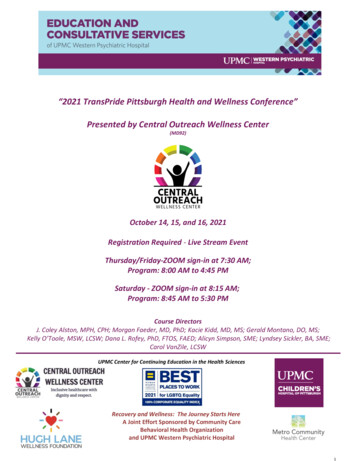
Transcription
DREXEL UNIVERSITY &UNIVERSITY OF PITTSBURGHChester CountyReport of the Cross‐Systems Mapping WorkshopJune 29, 2010Transforming Servicesfor Persons with Mental Illness inContact with the Criminal Justice System
Chester County, PA Mental Health and Justice Center of Excellence Report, June 2010FacilitatorsPatricia A. Griffin, PhD, Center of Excellence Senior ConsultantMary Gregorio, MA, Southeast Regional Mental Health Services ConsultantOther SupportTory Bright, Southeast Regional Mental Health Services CoordinatorPaul Butler, Southeast Regional Mental Health Services Forensic LiaisonCasey LaDuke, Center of Excellence Research AssociateCenter of Excellence StaffDavid DeMatteo, JD, PhDSarah Dorrell, MSWSarah Filone, MAKirk Heilbrun, PhDEdward P. Mulvey, PhDMarcel SchipperCarol Schubert, MPH2
Chester County, PA Mental Health and Justice Center of Excellence Report, June 2010Table of ContentsTransforming Services for Persons with Mental Illness in Contact with theCriminal Justice SystemIntroduction . 4Background . 4About the Workshop. 5Objectives of the Cross-Systems Mapping Exercise . 5Keys to Success. 6Chester County, PennsylvaniaChester County Cross Systems Map . 7Chester County Cross Systems Narrative. 8Intercept I: Law Enforcement / Emergency Services .10Intercept II: Initial Detention / Initial Court Hearing.15Intercept III: Jails / Courts .17Intercept IV: Re-Entry.21Intercept V: Community Corrections / Community Support .24Chester County Priorities . 26Conclusion . 28Closing . 28List of AppendicesAppendix A – Participant List.30Appendix B – Chester County Data.41Appendix C – MH/IDD Definition of Serious and Persistent Mental Illness .39Appendix D – Additional Website Resources .40Appendix E – Reources for Specialized Police Response and Law Enforcement/BehavioralHealth Collaboration at Intercept 1 .41Appendix F – Resources for Improving Re-Entry .45Appendix G- Resources for Veterans Involved in the Criminal Justice System . .47Appendix H- Resources for Community Education 483
Chester County, PA Mental Health and Justice Center of Excellence Report, June 2010Chester County, PennsylvaniaTransforming Services for Persons with Mental Illness in Contact withthe Criminal Justice SystemIntroductionThe purpose of this report is to provide a summary of the Pennsylvania Mental Health andJustice Center of Excellence Cross-Systems Mapping workshop held in Chester County,Pennsylvania, on June 29th, conducted by the Pennsylvania Mental Health and Justice Centerof Excellence. The workshop was hosted by the Chester County Mental Health/Intellectual andDevelopmental Disabilities and the Chester County Department of Probation and Parole as partof an ongoing process of developing collaborative systems of support for individuals who havemental illness and who come in contact with criminal justice. This report (and accompanyingelectronic file) includes: A brief review of the origins and background for the workshopA summary of the information gathered at the workshopA cross-systems intercept map as developed by the group during the workshopA description of each intercept along with identified gaps and opportunitiesPriorities and “next steps” determined by the groupBackgroundChester County Office of Mental Health and Intellectual and Developmental Disabilities and theChester County Department of Probation and Parole requested the Center of Excellence CrossSystems Mapping workshop to promote progress in addressing criminal justice diversion andtreatment needs of adults with mental illness in contact with the criminal justice system. TheCross-Systems Mapping workshop was seen as an opportunity to engage mental health,substance abuse, and criminal systems stakeholders in examining the county’s strengths andweaknesses at each Sequential Intercept and identify priorities for change and/or integration.As part of the workshop, they were requested to provide assistance to Chester County with: Creation of a map indicating points of interface among all relevant Chester County systems Identification of resources, gaps, and barriers in the existing systems Development of priorities to promote progress in addressing the criminal justice diversionand treatment needs of adults with mental illness in contact with the criminal justice system.Prior to the workshops, the Center of Excellence gathered information about Chester Countythrough a Community Collaboration Questionnaire, a preliminary meeting by conference call,and documents relevant to the population.The participants in the workshops included 43 individuals representing multiple stakeholdersystems including mental health, substance abuse treatment, human services, corrections,advocates, family members, consumers, law enforcement, and the courts. A complete list ofparticipants is available in the Appendix A of this document. Patty Griffin, PhD, SeniorConsultant from the Center of Excellence and the CMHS National GAINS Center and Mary M.Gregorio, MA, Consultant for the SE Regional Mental Health Services Coordination Officefacilitated the workshop sessions. Tory Bright and Paul Butler of the SE Regional Mental Health4
Chester County, PA Mental Health and Justice Center of Excellence Report, June 2010Services Coordination Office and Casey LaDuke and Sarah Dorrell of the Center of Excellencealso provided support.About the WorkshopUpon receiving a grant from the Pennsylvania Commission on Crime and Delinquency and thePennsylvania Department of Public Welfare’s Office of Mental Health and Substance AbuseServices, the Pennsylvania Mental Health and Justice Center of Excellence was developed as acollaborative effort by Drexel University and the University of Pittsburgh. The mission of theCenter of Excellence is to work with Pennsylvania communities to identify points of interceptionat which action can be taken to prevent individuals with mental illness from entering andpenetrating deeper into the justice system.The Center of Excellence Cross-System Mapping workshop is tailored to each Pennsylvaniacommunity. The workshop provides an opportunity for participants to visualize how mentalhealth, substance abuse, and other human services intersect with the criminal justice system.This workshop is unlike other types of consultations or staff development training programs. Akey element is the collaborative process. Meaningful cross-system collaboration is required toestablish effective and efficient services for people with mental illness and co-occurringsubstance use disorders involved in the criminal justice system. This makes the composition ofthe group extremely important. While some workshops involve advertising to the entire providercommunity, it is essential in the workshops that the organizers gather a group that representskey decision makers and varied levels of staff from the relevant provider systems. Center ofExcellence staff work with this group, serving as expert guides to help the group: Create a cross-systems map indicating points of interface among all relevant local systemsIdentify gaps, opportunities, and barriers in the existing systemsOptimize use of local resourcesIdentify and prioritize necessary actions for changeUpon completion of the workshops, the Cross-Systems Map included in the report is provided inboth print and electronic formats. It is meant to be a starting point. The electronic files can berevised over time to reflect the accomplishments and changes in the planning process.Objectives of the Cross‐Systems Mapping ExerciseThe Cross-Systems Mapping Exercise has three primary objectives:1. Development of a comprehensive picture of how people with mental illness and co-occurringsubstance use disorders move through the Chester County criminal justice system alongfive distinct intercept points: Law Enforcement and Emergency Services, Initial Detention/Initial Court Hearings, Jails and Courts, Re-entry, and Community Corrections/CommunitySupport.2. Identification of gaps, resources, and opportunities at each intercept for individuals in thetarget population.3. Development of priorities for activities designed to improve system and service levelresponses for individuals in the target population.5
Chester County, PA Mental Health and Justice Center of Excellence Report, June 2010Keys to SuccessExisting Cross-Systems PartnershipsChester County’s history of collaboration between the criminal justice and behavioral health systemsis reflected in a number of existing local efforts that were identified prior to the mapping, including: Mental Health, Recovery, and Drug CourtsChester County Forensic CommitteeCrisis intervention training for law enforcementMental Health Probation ProtocolAdult Cross Systems’ TrainingDedicated forensic mental health assessment, treatment, case management and housingCollaborative exchange of information among agencies to promote continuity of care, safety,and enhanced servicesAccelerated Rehabilitative Disposition (ARD)Joint efforts by the Mental Health Office of the County MH/IDDD Department and the AdultProbation Department to pursue grant funding for collaborative initiativesConsumer/Family Involvement in the Workshops Consumers were represented by two Peer Specialists.Consumers added valuable information to the discussion especially about the role of PeerSpecialists in the community and in the prison, supports offered through CommunityCrossroads which is a peer run support center, and ideas about differentiating between“crisis” and needs that may be urgent but do not rise to the level of crisis.The Chester County National Alliance on Mental Illness (NAMI) was represented by a familymember who contributed information and support opportunities available both to familiesand to law enforcementRepresentation from Key Decision Makers in the Workshops The workshops included wide cross-system representation and involved many of the keydecision makers.Opening remarks by Ruth Kranz-Carl, Human Services Director, and The Honorable William P.Mahon set the stage and established a clear message as to the importance of the workshop.Gary Entrekin, MH/IDD Administrator, welcomed participants and introduced the facilitators.Data CollectionData collected prior to the mapping workshop indicate that the numbers of offenders withserious mental illness in the County prison increased in FY 2010 after years of steadydecreases or stable numbers (see Appendix B).6
Chester County Cross Systems Map
Chester County, PA Mental Health and Justice Center of Excellence Report, June 2010Chester County Cross Systems Narrative, Gaps, and OpportunitiesThe Cross-Systems Mapping exercise is based on the Sequential Intercept Model developed byMark Munetz, M.D. and Patty Griffin, Ph.D. 1 in conjunction with the National GAINS Center. Inthis workshop, participants were guided to identify gaps in services, resources, andopportunities at each of the five distinct intercept points.This narrative reflects information gathered during the Cross-Systems Mapping Workshop. Itprovides a description of local activities at each intercept point, as well as gaps andopportunities identified at each point. This narrative may be used as a reference in reviewing theChester County Cross-Systems Map. The cross-systems local task force may choose to reviseor expand information gathered in the activity.The gaps and opportunities identified in this report are the result of “brain storming” during theworkshop and include a broad range of input from workshop participants. These points reflect avariety of Bucks County stakeholder opinions, and are therefore subjective rather than amajority consensus.General Description of Services and Cross-System CollaborationChester County is one of the three original counties of Pennsylvania created by William Penn in1682. The county is located in Southeastern Pennsylvania and has a population of 491,489 across75 municipalities. It spans 760 square miles, which adds to the complexities of law enforcement andthe provision of mental health services alike.The County has been building a continuum of criminal justice and mental health/addiction treatmentservices that provides a basic foundation for continued growth and reorganization on all levels.There are a number of established links, both formal and informal, between the courts, probation,police departments, corrections and the mental health system that include, but are not limited to: The development of Treatment Court consisting of Mental Health, Recovery and Drug Courttracks. Access to emergency inpatient services, as well as an increasing array of community mentalhealth services Availability of 24-hour crisis response Development of an Intermediate Punishment and Restrictive Punishment (Recovery Court)Sentencing Alternatives for substance dependent offenders Chester County Forensic Committee Mental Health Probation ProtocolThe Chester County Department of Mental Health/Intellectual and Developmental Disabilities(MH/IDD) administers federal, state, and county funds for mental health, mental retardation, andearly intervention services. MH/IDD works closely with the DHS/Office of Managed BehavioralHealth and Department of Drug & Alcohol Services to plan and coordinate public mental health1Munetz, M. & Griffin, P. (2006). A systemic approach to the de-criminalization of people with seriousmental illness: The Sequential Intercept Model. Psychiatric Services, 57, 544-549.8
Chester County, PA Mental Health and Justice Center of Excellence Report, June 2010and substance abuse systems development and services that serve 7000 consumers annually.The Office of Mental Health within MH/IDD contracts with 25 mental health agencies for anarray of treatments and supports to serve over 1400 consumers annually. The county has fourmulti-service agencies that are points of entry for adult public mental health care and six similarpoints of entry for child services.The Chester County Office of Mental Health serves county residents who live with serious andpersistent mental illness. With an annual budget of about 16,000,000, the Office uses federal,state, and county funds to provide services to approximately 5000 eligible individuals (includingHealthChoices members) each year. Clients typically are county residents who: have serious and persistent mental illness; have no private insurance for mental health care; and are not eligible for Medical Assistance; or require residential or other services that are not HealthChoices billable.The Office of Mental Health works closely with the county’s Office of Managed Behavioral Healthand managed care contract, Community Care Behavioral Health, which together run theHealthChoices program to coordinate all publicly funded behavioral health services and supports.Many individuals with serious and persistent mental illness qualify for HealthChoices supports aswell as county-funded supports. The Office of Mental Health contracts with local agenciesthroughout the county to provide services. Chester County has four Core Providers for adultservices:Fellowship Health Resources (Phoenixville)Holcomb Behavioral Health Systems (Kennett Square)Creative Health Services (Spring City, PA)Human Services, Inc., Downingtown, PAA listing of additional resources for adult services is available at http://www.referweb.net/chesco/.The Court, the Director of Human Services and the Probation Department Director are membersof the county Criminal Justice Advisory Board (CJAB) that meets regularly to coordinate andplan criminal justice efforts, many of which involve the human services system. The MH/IDDAdministrator participates in monthly meetings of the county human services department headsand the Juvenile Probation Office Chief. Mental Health and Adult Probation officers participateon the Mental Health Court team and work closely with the County Prison, District Attorney,Public Defender, Pretrial Services, and the Coatesville Veterans Affairs Medical Center. TheOffice of Mental Health has close working relationships with other human services departmentsincluding Aging; Drug and Alcohol Services; Children, Youth, and Families; Youth Center, andthe Office of Managed Behavioral Health.9
Chester County, PA Mental Health and Justice Center of Excellence Report, June 2010Intercept I: Law Enforcement / Emergency ServicesIf an officer who has been dispatched believes the individualis in need of mental health crisis support, the officer canrequest support from Valley Creek Crisis Center directly orvia dispatch. Valley Creek Crisis Center has mobile serviceand can respond on site or via phone support.Law EnforcementEmergency Service call takers will call Valley Creek CrisisCenter if the caller is suicidal or indicates a need for mentalhealth crisis services. Local dispatch can also request thatValley Creek Crisis services be involved.911Chester County has a centralized, county-operated 911system with local dispatch. All calls to 911 have a onebutton connection to local law enforcement dispatch. Thereare 54 call takers on the Chester County EmergencyService. Individuals can also call a local police departmentdirectly. The amount of calls going to either 911 or localdepartments varies across local jurisdictions (e.g., it wasindicated that as many as 99% of calls in West Chester gothrough the 911 system).Intercept 1Law enforcementCOMMUNITY911Law EnforcementThere are 47 local law enforcement agencies in ChesterCounty including 2 State Police Barracks, CoatesvilleVeteran’s Center campus police, and Lincoln University andWest Chester University campus police. 888 police officers serve in the County. As many as80% of law enforcement agencies in Chester County have fewer than 10 officers. There aretypically two State Police officers on duty per night shift.Chief Scott Bohn of the West Chester Police Department is currently President of the County’sChiefs of Police Association.Officers are trained through the Municipal Police Officer Training Curriculum (MPOC). Act 120training is a requirement for all officers and covers training in Criminal Law and Investigation,Vehicle Code, Accident Investigation, First Aid & CPR, Operation of Patrol Vehicle, CrisisManagement, and Defensive Tactics and Firearms. The Crime Victim’s Center (Sexual AssaultResponse Team) has also provided training for police officers in Chester County. Additionaltraining in crisis de-escalation and mental health is offered through Montgomery CountyEmergency Services but is not required.When intoxicated individuals are arrested, they are frequently detained at the police station anda citation is issued. If the individual is taken to an emergency room, there may be a referral to anon-hospital detoxification provider.A review of 14 months of referrals since the inception of the Mental Health Court suggested that29 individuals with clear symptoms of mental illness at the time of the arrest could havepotentially been referred to crisis services instead of arrest. Of the 29, 16 were successfullydiverted to treatment after arrest.10
Chester County, PA Mental Health and Justice Center of Excellence Report, June 2010Valley Creek Crisis CenterValley Creek Crisis Center (VCCC) is a 24/7 crisis center staffed by master’s level clinicians, anurse, and a peer specialist with access to on-call psychiatry. Depending on the time of daythere are also 3-5 mobile teams available to go into the community. The highest staffingtypically occurs during the 3-11pm shift. Phone support is provided in the event that a mobileteam is not available. Valley Creek Crisis Center includes staff fluent in Spanish and inAmerican Sign Language.Valley Creek Crisis Center handles approximately 1000 calls per month, or several hundredcalls per week. They can also have dual calls with a dispatcher and a crisis specialist. Aminimal number of calls come from law enforcement, approximately 10 to 15 per month. ValleyCreek Crisis has an 800 number with two other numbers routed into a single t-line that leads to23 lines covered by 3-10 call takers. Individuals who call are not put on hold.Valley Creek Crisis Center can identify individuals who have mental health case management orACT services in order to contact an ICM or ACT staff if an individual is in crisis. Overall VCCCis aware of approximately 700 of these clients. VCCC mobile teams will also go to local hospitalemergency rooms when contacted regarding a person in crisis. Valley Creek Crisis Center is notcurrently set up to be a hospital-based system, or a drop off site, however they will coordinatethe services for individuals who walk in; including those who are brought in by police and whocan be safely accommodated within the Center. VCCC is not able to serve intoxicatedindividuals; nor do they prescribe medications, however, they can directly refer individuals todetox after hours.Valley Creek Crisis Center can be reached at (610) 918-2100 or toll-free at (877) 918-2100.Valley Creek Crisis Residential ProgramValley Creek Crisis Residential Program is a voluntary program that offers short-term residentialtreatment to accommodate adult consumers in need of behavioral health services. It isdesigned to be less restrictive than an inpatient psychiatric hospitalization. Treatment andpsychosocial supports are available in the crisis residential program to individuals in acutepsychiatric crisis but who are able to remain within the community.VeteransSuicide crisis information for veterans and their families can be obtained from Rebecca Baird ofthe Coatesville VA Medical Center at 610-384-7711 x3011. A veteran may contact the SocialWork Department at the Coatesville VA Medical Center at 610-384-7711 x5160 and be matchedto talk to someone with similar military service. The Treatment Court has also established aveteran treatment track for those who get involved in the criminal justice system and worksclosely with the Coatesville VA Medical Center to provide needed mental health and substanceabuse treatment services.The national VA Suicide Hotline number is 800-273-8255.Warm LineValley Creek Crisis has a consumer-run warm line dedicated to mental health consumers whowant to receive peer support and who may need resource information. An important goal of theWarm Line is to proactively support consumers before a crisis develops. The Warm Linehandles about 100 calls a month from consumers and family members.11
Chester County, PA Mental Health and Justice Center of Excellence Report, June 2010The Warm Line is open seven days a week, six hours a day: (M-F, 2:00pm to 8:00pm and SatSun, 12:00pm to 6:00pm). The Warm Line is available at (866) 846 2722.Crossroads Peer Support CenterCrossroads Peer Support Center provides support for individuals in mental health and addictionrecovery, and is currently used by about 27 individuals. Peers are available to support others intheir recovery and to assist in preventing problems from becoming crises. Peers are alsofocused on helping those in the community identify and utilize available resources.Chester County National Alliance on Mental Illness (NAMI)The local chapter of NAMI is located in the same building as the Crossroads Peer SupportCenter, and often collaborates with Crossroads in crisis situations. NAMI representative,Debbie Thompson, indicated that the local NAMI receives many calls from families whose familymember has come in contact with the criminal justice system. The local NAMI created a“forensic guide” which will be updated and available to both family members and lawenforcement.Intensive Case Management (ICM)Approximately 600 individuals in Chester County with serious mental illness receive servicesthrough Intensive Case Management. Those individuals will frequently call a case managerrather than crisis services, and the case manager will then contact law enforcement whennecessary.Inpatient HospitalizationBrandywine Hospital is the only provider in the county with adult psychiatric inpatient beds.Though not located in Chester County, Pottstown Memorial Medical Center (MontgomeryCounty) is frequently used as a drop off by police officers in the northeastern region of ChesterCounty.The following listing of gaps and opportunities reflect the subjective opinions of the broad rangeof stakeholders participating in the workshop. There was much discussion and sometimesdiffering points of view during these “brainstorming” sections of the workshop. Identified Gaps Law enforcement face a variety of time consuming procedures that presentsignificant barriers to referring individuals to treatment instead of arresting theperson, including; emergency room medical clearance, mental health evaluation todetermine placement, insurance authorization, bed search, ambulance transport, andhospital requirements for securityo Some officers report waiting as much as eight hours Limited data about crisis calls Limited data about law enforcement calls with the target population Multiple challenges for law enforcement agencies when it comes to having officers12
Chester County, PA Mental Health and Justice Center of Excellence Report, June 2010 attend trainings on behavioral health issues including size and number ofdepartments, geography, cost, overtime costs, department coverage for smalldepartments, cost/benefit ratio, and perception of the training as not useful if there isno efficient central assessment and disposition option for people in crisisLimited Information about 911 crisis activities; what happens within the CountyHigh number of repeat callers to 911Insufficient awareness of available mental health resources in the community302 training for law enforcementLittle follow up for families/individuals to be connected to MH resources when policehave frequent contact/callsLimited notification to the mental health resources that an individual is in need basedon police contactNo information about HIPPAA to guide police contact with mental health resourceswhen they are on the scene and there is possibility of arrestInability to identify veterans at time of first contactLimited access to information about veterans in contact with criminal justice andabout available VA resourcesLocal criminal charges are pressed by the VA Police Department against a smallgroup of veterans for disruptive behavior on the grounds of the Coatesville VAMedical CenterLaw enforcement do not have access to historical information about a person incrisis (mental health or drug and alcohol)No access to private insurer information for a person in crisis in contact with thepoliceLittle cross-police department sharing of informationMinimal use of Crisis as the first response for policeLittle drug and alcohol services contact with law enforcement concerning theseclients until bail setting and sentencingLimited mental health, drug and alcohol, and crisis de-escalation training/resourcesfor policeo Municipal Police Officer’s Education and Training Commission offers six hours ofmental health trainingo Limited use of training that has been offered in the past by MH providersNo central booking in the countyLimited psychiatric inpatient beds in county Identified Opportunities Interest in police intervention and consistent/practical training A number of the law enforcement agencies have expressed interest in the CrisisIntervention Training (CIT) model, but see a need to develop a broader system-wideinfrastructure to address the crisis system issues Consider ride-alongs as part of training for behavioral health and criminal justice staffand support for greater cross-system collaboration Training, resources and resource materials available from Crossroads Peer SupportCenter as well as from local NAMI (e.g., NAMI family forensic guide) PA 211 line (for mental health resource information) will be operational later this year Police keep a PREMISE history on some individuals which offers the opportunity toidentify an appropriate community resource to assist with that individual Interest in building relationship between Mental Health Crisis and Police response;possibilities for Valley Creek satellite sites Valley Cree
(MH/IDD) administers federal, state, and county funds for mental health, mental retardation, and early intervention services. MH/IDD works closely with the DHS/Office of Managed Behavioral Health and Department of Drug & Alcohol Services to plan and coordinate public mental health . 1 Munetz, M. & Griffin, P. (2006). A systemic approach to the .











